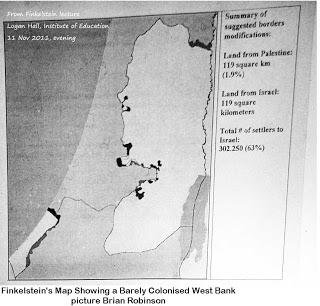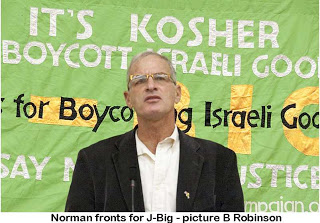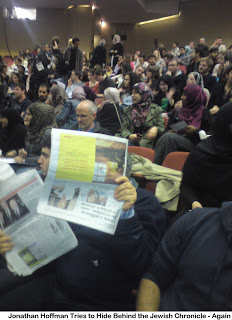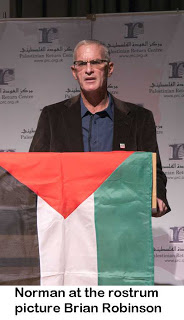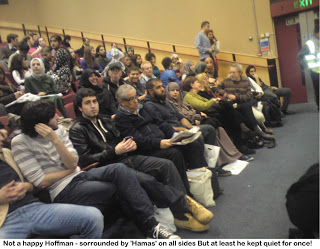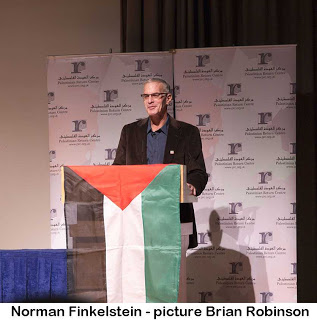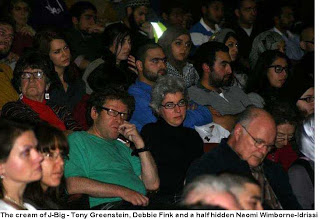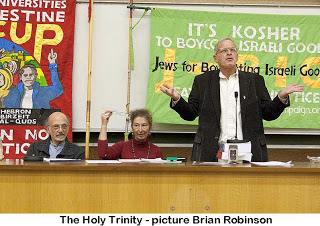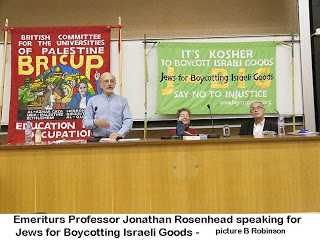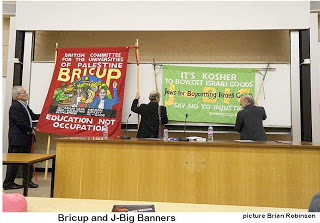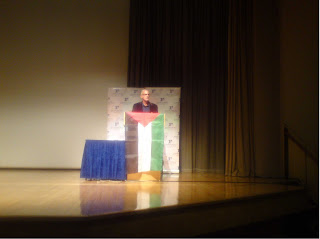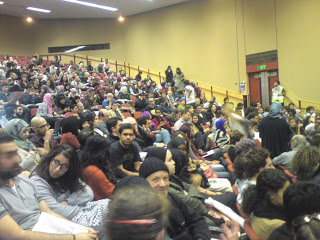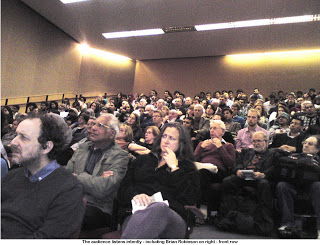Norman Finkelstein’s talk at the Institute of Education’s Logan Hall last Friday night was a sell-out. The organisers claim a thousand people attended. When the meeting started, about half an hour late, Norman Finkelstein was greeted with rapturous applause as if he was a rockstar.
We even had the amusement of Jonathan Hoffman, co-vice chair (they had to invent the post!) of the Zionist Federation sitting one row in front of the officers of J-Big! When Debbie Fink began to welcome him to the meeting and strike up a friendly conversation, Hoffman, without a word, got up and left. Except by then he found difficulty getting a seat. When he did find one we ensured security knew who he was. And guess what? For the first time ever at a Palestine meeting there wasn’t a peep out of him. Clearly it’s been a hard week what with UJS attacking him and then a Palestine meeting without friends.
The meeting had been sponsored by the Palestine Return Centre and Jews for Boycotting Israeli Goods. There had been an earlier debate in the afternoon between Finkelstein and Emeritus Prof. Jonathan Rosenhead of J-Big over the merits of an academic boycott, in which I understand, although I wasn’t there, Finkelstein grudgingly accepted the case for an academic boycott.
However, as Naomi Foyle’s separate report, which I reproduce below states, his stance there was that just because the Palestinians do something, it does not mean we should automatically support it. In fact this is true, just because Palestinians support a particular objective or tactic, it does not mean that those in solidarity with them have to go along with their politics. Even if Finkelstein gave a particularly crass analogy, with suicide bombers (I don’t think there’s ever been a demand on other organisations to support ‘suicide’ bombing), the principle is correct.
That is why I was somewhat astounded that come the evening talk, one of Norman Finkelstein’s more rhetorical points was that if the Palestinians supported a 2 State Solution (although he admitted in declining numbers) then it was our obligation to support it. This is what is normally known as political and academic dishonesty.
To say that I was disappointed with Norman Finkelstein’s talk would be an understatement. Norman Finkelstein has had a remarkable career before the McCarthyites at De Paul University, New York, terminated his academic career by denying him tenure on political grounds. The warmth of the audience to Norman Finkelstein was clearly because of this, yet there are limits such indulgence and they have been reached.
Not once in his speech, a self-indulgent 2 hours, which meant there was virtually no time for any audience contribution, did Norman Finkelstein mention the word ‘Zionism’. It is as if Israel magically appeared. As if its behaviour towards Palestinians is some form of aberration. As if the occupation of the West Bank and Gaza is out of character. And as if Israel, once it hands back all the 1967 territories, will become a normal state. In fact he said none of this but implied everything I have imputed above.
I suspect that if the younger Norman Finkelstein had listened to the speech then he would have been far more critical of what was said than anything I can say. The young Norman Finkelstein was a remarkable analyst and critic. There is no one who did a better demolition job on the fraudulent Joan Peter’s From Time Immemorial, which claimed that the Zionists attracted like a magnet most of the Palestinians that they later expelled. To say that Norman Finkelstein demolished her and her wretched book is an understatement.
And when Daniel Goldhagen wrote ‘The Germans: Hitler’s Willing Executioners’ which stated that the Germans, not Nazis, killed Jews because they were a particularly sadistic and cruel nation, that it was a part of the German psyche, Norman Finkelstein tore him to pieces. So devastating was Norman Finkelstein’s criticism, that Goldhagen threatened him with libel initially, rather than reply to the substance of the criticism.
Finkelstein’s first book in particular, Holocaust Industry, is a masterpiece. The pre-eminent holocaust scholar Raul Hilberg, author of the Destruction of European Jews was a ‘strong supporter’ of Norman Finkelstein. Finkelstein tore into the Zionist Jewish Claims Conference which has embezzled millions of dollars, intended for the holocaust survivors, for the Zionists’ pet projects (as well as more mundane corruption a plenty). Indeed this was too much for the Socialist Workers’ Party resident guru, Professor Alex Callinicos [Finkelstein and the holocaust ]
Norman Finkelstein is proud to be the child of parents who survived the death camps of Maidenek and Auschwitz. He is not an Atzmon or Shamir holocaust denier. He has made his support for the Palestinian resistance, including Hezbollah quite clear (even if at times he is somewhat uncritical). But instead of treating the audience to further insights what does he do? Regale us about why 2 States is a wonderful idea whereas 1 State is just a pipe dream. To say that I was disappointed is to put it mildly. Here he had a thousand people in the palm of his hand, and he wasted his time with what is fast becoming an obsession – that Palestinians should be grateful for and accept a mini-state on the West Bank.
The lynchpin on which apparently everything rests is International Law and the United Nations. Norman Finkelstein isn’t the first to succumb to the rhetoric of the UN or the idea that it somehow represents the nations of the earth, Uri Davies is also guilty of the same sin. But Norman Finkelstein has a particularly sabre-like mind. He is an excellent debater. He knows full well that most of what he spoke about is complete and utter nonsense.
Every year the United Nations, whom Norman Finkelstein described as the most representative and democratic body of world opinion, passes a motion, by between 170-2 and 167-7 votes, calling for a just solution to the refugee problem. In fact the United Nation is gang of thieves and cut-throats. Its representatives include the ‘democratic’ ciphers of the Saudi, Bahrain and Syrian regimes, the Generals of Burma, the butchers of Sri Lanka, the heirs of Tianneman Square, the Putin Mafia and in their time, at the US’s insistence, the representatives of Pol Pot of Cambodia. Indeed the only people who are not represented in the UN are the poor and impoverished of the world, i.e. about 2/3 of the world’s 7 billion people. The UN is a parody of the organisation that the world needs if it is to survive global warming.
Yes these regimes do indeed pass resolutions supporting the Palestinians. And then they proceed to ignore them! The Indian government pays lip service to the Palestinians but that doesn’t stop them having the closest military relationship with Israel. The same goes for Sri Lanka and many other states. Instead Norman Finkelstein had much fun with the fact that the only states who Israel could count upon were El Salvador and the various atolls in the Pacific Ocean.
It is true that Palau and Micronesia are the only states to openly support Israel. But at least they are being honest. Is Egypt behaving better by condemning Israel and then operating on Israel’s behalf the siege of Gaza, which to this day is in operation?
This is the basis for all the international law legitimacy that Norman Finkelstein cited in support of the argument that there is no support for a 1 State solution and that it is a complete pipe-dream to support anything other than 2 States. In fact international law is a dubious concept, vague at best. Who legislates for the ‘international community’ [for which read ‘gang of thieves and cut-throats?] How is international law implemented? Who is held accountable? What body impartially administers it?
We all know that the International Criminal Tribunal at the Hague prosecutes only anti-western war criminals. The George Bushes, Tony Blairs, King Feisals and Pinochets of this world have nothing to fear.
Just as the United Nations has a Human Rights Council and Commissioners. Not one country has proposed that the UN reverse its policy of opposition to torture, yet a large majority of its members practice torture as an act of state policy. Is this the body that should lay down the guidelines for a solution to the Palestinian question? And more the point, isn’t the United Nations the same body that proposed the creation of the Israeli state and which has never, not once, proposed a single sanction or punitive action against Israel for disregarding its resolutions on the refugees, settlements, occupation etc?
What the UN represents, in all its glory, are the representatives of the capitalist world system. The imperialist powers and its subject clients. In practice it is controlled by the Security Council, on which the major imperialist powers have a right of veto. Democratic? Hardly.
Or take the Arab spring. The Libyan people rose up against Ghaddaffi and the UN supported a bombing campaign whose aim was regime change. The reason? Ghadaffi’s undoubted crimes against his own people. The Arab League even suspended Libya from membership, as it has now done in the case of Syria.
But there were other guilty parties. In Bahrain there were also massacres when Saudi Arabia sent in its troops to protect the Royal Family. The level of oppression was so intense that even medical staff who tended the injured, were accused of complicity with the people, arrested, tortured and imprisoned for 15 years. Yet what has been the UN’s response? Yes you’re right. Absolutely nothing.
The history of the UN’s role in Rwanda, the Congo and the assassination of Patrice Lumumba are another story but to pretend that the UN is an impartial administrator and creator of international law is a fiction. The UN has never liberated anyone, so those who propose it as a suitable instrument in the case of Palestine should at least explain their Palestinian exceptionalism.
Norman Finkelstein calls himself, apparently, ‘an old-fashioned communist’ . Unfortunately there was little of his communism on display at his talk. It was an ideologically free area.
Norman Finkelstein stressed how people in the West now support the Palestinian people, despite the BBC and their leaders in Congress. And this is true. But part of the reason is because of the activity of those in the West who put over the message of Palestine through the campaign of Boycott, Divestment and Sanctions. All campaigns which Norman Finkelstein opposes.
But even this is a lazy refuge not an academic argument. People support the Palestinians because they are oppressed. People do therefore support the right of the Palestinians to self-determination. But the question of one or two states does not impinge upon peoples’ consciousness. People support freedom from oppression. How this is achieved is, for most people, a secondary question.
But there is an idea and word that Norman Finkelstein has now banished – Zionism, even though it was the title of his doctoral essay. For people to support, or oppose 1 or 2 States, there has to be an understanding of what happens not merely in the Occupied Territories but inside Israel itself. But upon this Norman Finkelstein had absolutely nothing to say.
To Norman Finkelstein Israel is just another state. The problem is that it has overreached itself. Yet Norman Finkelstein above all is aware of the fact that Israel is not a normal state. He knows fully well that Israel is a state, not of its own citizens, but the Jewish people wherever they may be. He devoted a chunk of his speech to the inability of Israel’s most famous ‘liberal’ judge Aharon Barak to reconcile the irreconcilable – that Israel is both a Jewish and a Democratic state. It is of course impossible to square the circle because if Israel is democratic, then that must mean that the Palestinians have not only equal rights with their Jewish counterparts but that they have the right to form the majority. A Jewish state means otherwise and therefore cannot be democratic. This is, of course, recognised by the more honest Zionists themselves. It was Meir Kahane, the neo-Nazi Zionist Knesset Member for Kach, who posed the question most starkly – either Israel is a Jewish state or a democratic state. It cannot be both.
In an article on the new Jewish State Bill, sponsored by members from the Kadimah (Zionist centrist party), Likud and Yisrael Beteinu (Avigdor Liebermann’s far-right party) entitled ‘This Party must be destroyed’ [he was referring to Kadima] Yossi Sarid, a former Meretz member of the Knesset writes that
‘The Jewish state will devour Israeli democracy until no trace remains to indicate it once existed in the illuminated part of the earth.’ He goes on to say that ‘A proposal submitted to the Knesset on Wednesday will change the state’s definition, no less. The “Jewish and democratic” part is being revoked to establish the “nation state for the Jewish people.”
Of course this is nothing really new. Sarid had no complaints when Labour Zionism introduced apartheid legislation. But at least then it had the good sense to disguise it, to sub-contract the dirty work to bodies like the Jewish National Fund (that Norman Finkelstein also didn’t mention). The real crime of the present Netanyahu/Liebermann government is to be open in its desire to eradicate an Arab presence in Greater Israel.
To give an example of why Israel is unique today as a settler-colonial state, the JNF is a good example. It is an apartheid institution, which controls 93% of Israeli land. It did not begin its work under Sharon or Begin. The JNF-Jewish Agency Status Law of 1953, the Agricultural Settlement Law 1967, the Covenant between the State of Israel and the JNF and the various Israeli Lands Administration laws 1960-1, were works of Labour Zionist not Likud governments. As the JNF wrote on its web pages after a decision of the Israeli High Court in the Kadaan case, which stipulated that in future the Israeli Lands Authority could not deny the right of Arabs to lease and rent its land (since overturned through legislation by the current government):
‘A survey commissioned by KKL-JNF reveals that over 70% of the Jewish population in Israel opposes allocating KKL-JNF land to non-Jews, while over 80% prefer the definition of Israel as a Jewish state, rather than as the state of all its citizens.
Yet none of this appeared in Norman Finkelstein’s talk. The implication was that an Israel behind 1967 lines would be a more or less democratic state where Arabs could live in peace and harmony. There was no attempt by Norman Finkelstein to deal with what a 2 State resolution would actually mean in practice.
The first thing that would happen, as Israeli negotiators, not least Kadimah’s Tsipi Livni, made clear [see the Palestine Papers] is that Israeli Arabs will be transferred where possible into such a state against their will. The areas they live like the Triangle and Umm-el-Fahm, will be ‘swapped’ for the land that the settlements occupy. Israel’s Arab citizens, tolerated at best, distrusted by most Israeli Jews, will be given no say over this.
But the more important question, one that one would expect Norman Finkelstein to have at least recognised, was that in a 2 State solution, there will be a build up of hatreds and fear. The Palestinian statelet (i.e. reservation) will become the object of Israel’s frustrations, the target of its leaders whenever things go wrong. It won’t be long before there is a ‘preventive’ war and a reoccupation.
Why should there be a need for Jews and Palestinians to live apart in separate states? Are they incompatible? Is there some incompatibility between them? Is a Palestinian presence too much to bear for Israeli Jews? Far from diminishing present hostilities, all the racial fantasies about ‘dirty Arabs’ ‘Arab terror’ ‘lazy Arabs’ etc. will be given added impetus.
Norman Finkelstein’s main argument is that ‘world opinion’ i.e. the Gang of Thieves & Cut-throats (aka the UN) will not support a single state. But they don’t, in practice support 2 states either. No penalties have been attached to Israel’s use of negotiations as a cover for settlement. In fact the real world opinion, that of ordinary people on the street, is quite susceptible to the one-state idea. No one I know suggested that in South Africa there should have been a separate White state. Why should the same be different with Israel? The only reason I know is that there is a rough parity of populations. But this is an argument for having a single state. Israeli Jews have much less to fear because they will not have a majority dominating them.
When people ask what our solution is, then the response – a state where both Jew and Arab can live in peace together – seems quite reasonable. At least to most of those I have talked to.
Partition on the other hand has an unenviable record. Wherever it has been tried – almost always a response to the calamity of colonialism – it has been a terrible failure. Not only were up to 2 million people slaughtered in the partition of India and Pakistan, but we have had thousands die as a result of Irish Partition, which has reinforced sectarian hatred in the North and will likely to do again before too long. In Cyprus the consequences were a Turkish invasion and more bloodshed. In short Partition is no solution yet the cerebral Norman Finkelstein didn’t even give a nod to the possibly calamitous consequences.
Instead, for reasons that are not entirely clear, Norman Finkelstein gave us the example of Ghandi as someone who accepted, reluctantly, the necessity to partition India. Much nonsense has been written about Ghandi and it is surprising that Norman Finkelstein falls for it, since he clearly knows something about Ghandi, claiming to have read all of his 100+ volumes of writing. Yet in reality be betrayed all the signs of having no understanding at all. Indeed this was the most disturbing part of Norman Finkelstein’s talk.
He spent considerable time on Ghandi’s role as head of an Ashram but didn’t even begin to understand the problems this caused. Ghandi was head of the Indian National Congress. This included both Hindus and Muslims. It wasn’t a confessional movement although the British continually sought to divide it along confessional lines. It was a national movement and to allow Hindu sectarianism in through the back (& later front) door was a historic political disaster.
The Morley Minto Reforms which were enacted by the British in the 1909 Indian Councils Act created for the first time communal electorates. Hindus and Muslims therefore voted separately for candidates for the Legislative Assembly Elections and later the Provincial elections. The previously marginal Muslim League began to take on a new importance and with Jinnah assuming leadership in 1913 it resulted in alienation of the Muslim League from supporting the independence struggle with Congress. With successive elections to the Provincial Legislative Councils under the India Act 1919 and the Government of India Act 1935, Congress lost more and more of its Muslim support. This was despite the accession of the leader of the Pathtan frontier province Abdul Ghaffar Khan in 1930, the ‘Red Ghandi’ who even in the 1946 elections turned in a majority for Congress.
In short Congress had, by accepting communal elections, accepted a 2 State position. There developed the discredited 2 Nations Theory that Muslims and Hindus were separate nations. If anyone was responsible for Partition then the blame lands at Ghandi’s feet above all. Ghandi it was who pioneered satyagraha, a philosophy of non-violence that was embedded in Hinduism. He was, as Norman Finkelstein pointed out, the head of a Hindu Ashram. The Provincial Congress governments formed in 1937 declared Hindi the national language and by their actions and policies further alienated Muslims.
Many myths have been made concerning Ghandi and his role. Not least by the British who credit his non-violence for their decision to ‘grant’ independence in 1947. The reality is that the British left because they were no longer able to stay. The war had finished them off as a world imperialist power. But that was not before they had crushed the Quit India movement in 1942 and about 2½ million Bengalis had starved to death.
In fact Ghandi preached non-violence to the oppressed and that included striking Bombay workers in their confrontation with the owners of the steel and jute mills. He was a representative of the rich peasants and industrialists, who had little sympathy with the poor. His strategy divided and blighted the Indian national movement and resulted in the carnage of 1947/8. Quite why Norman Finkelstein believes Ghandi stands as some sort of model was what I found most difficult to understand.
Norman Finkelstein’s main argument was effectively that the fact of 300,000 Israeli settlers, in fact ½ million when Jerusalem is taken into consideration, only occupy 1.9% of the land. This may be true in a literal sense but even settlers want somewhere to walk! The fact is that ½ million settlers and the hundreds of millions of dollars spent in building them are not just going to be abandoned by Israel.
What was strange about Norman Finkelstein’s talk was that despite ritual references to the corruption of the quisling Palestinian Authority (which certainly got a round of applause) Norman Finkelstein paid homage to the talents and skills of the Palestinian negotiators. Presumably Norman Finkelstein has never heard of the Palestine papers or if he has, he certainly didn’t mention the fact that these very same negotiators, under the hapless Saeb Erekat, offered Israel everything and gained absolutely nothing. They even abandoned Jerusalem, which Norman Finkelstein admits is crucial economically to the rest of the West Bank, ‘the biggest Yerushalayim in history’ in exchange for one district, Har Homa.
But when Norman Finkelstein says that 2 States represents the best hope for the Palestinians and that it is now very close, he is living on another planet. The fact is that Zionism has always opposed any recognition of Palestinian statehood and for very good reasons. Zionism is a settler-colonial movement. As such it is expansionist and seeks regional hegemony not confinement, sandwiched between the Mediterranean Sea and the Green Line. To it, the natural border is the river Jordan (& Litani). The ‘agreement’ of Sharon and now Netanyahu to a Palestinian state is purely a verbal device. There is absolutely no intention of granting any such thing. At best there will be a continuation of autonomy under Abbas with the faces of Israeli soldiers and jailers being replaced by that of Palestinians.
As Moshe Dayan was reported to have said in Ha’aretz of December 12, 1975:
’Fundamentally, a Palestinian state is an antithesis of the State of Israel… The basic and naked truth is that there is no fundamental difference between the relation of the Arabs of Nablus to Nablus and that of the Arabs of Jaffa to Jaffa… And if today we set out on this road and say that the Palestinians are entitled to their own state because they are natives of the same country and have the same rights, then it will not end with the West Bank. The West Bank together with the Gaza Strip do not amount to a state… The establishment of such a Palestinian state would lay a cornerstone to something else… Either the State of Israel — or a Palestinian state.’
Our task if therefore entirely different. There is already a one state solution, but an apartheid solution where nearly half the population is deprived of all political and civil rights, i.e. apartheid. The real task is to de-Zionist Israel and the creation of one unitary, secular and democratic Israel/Palestine. Like all settler peoples, the Israeli Jews, who profess no nationality of their own (there is no Israeli nationality) are Jewish Palestinians. That is their fate having come into Palestine of their own volition.
There is no need to create artificial state structures in order to impede the development of democracy. And that is why, although a talk to one thousand people is in itself a magnificent achievement, Norman Finkelstein wasted the opportunity by concentrating on what is rapidly become an obsession – the 2 States Solution.
As a footnote I should add that I met a number of Gilad Atzmon’s Palestinian supporters, all of whom are Islamic. In particular one Sameh Habeeb, the ‘Angry Man of Gaza’ came up and greeted me and told me what an amusing chap Atzmon is, albeit that he is somewhat obsessed by me! Clearly Habeeb is no longer angry, dressed in a sharp cut suit. More an aspiring member of the Palestinian bourgeoisie. As I left the debate he shouted out to me, for some strange reason, that my song was ‘Hava Nagillah’, an old Jewish religious song that the Zionist purloined. I shouted back ‘No, the Internationale’ the anthem of the international communist movement. Habeeb looked surprised as I repeated what I’d said. The Marxist Popular Front for the Liberation of Palestine is strong in Gaza and can rally thousands. One can only assume that Habeeb was too angry to notice at the time that there are songs which transcend nations and peoples!
On Friday Nov 11 2011, at UCL, world-renowned scholar and activist for Palestinian rights Prof Norman Finkelstein appeared in conversation with Prof Jonathan Rosenhead of BRICUP (British Committee for the Universities of Palestine), discussing the proposition:
The Palestinians having being denied justice for 63 years, those who support their rights must endorse their call for Boycott, Divestment and Sanctions (BDS), including academic and cultural boycott of Israel.
Prof Finkelstein also gave a public lecture in the evening, which unfortunately I could not attend. Following is my report on the afternoon conversation, which turned into a debate. I won’t give a blow-by-blow account of the discussion, which was videoed and presumably will soon be available online. Rather I will just summarise here the main disagreement between the speakers, and give my reaction to it.
Jonathan Rosenhead opened with a clear historical overview of boycott as a strategy, and ended by saying that in the case of Palestine, it should continue until the Palestinians ask us to stop supporting it – that is, until the system of oppression they suffer under has ended. Norman Finkelstein responded by arguing forcefully that the Boycott Divestment Sanctions campaign should work toward goals based in International Law, not some vague, impossible to define, outcome; and that we shouldn’t feel obliged to follow the Palestinians lead, as previously this would have obliged us to support suicide bombing. He said much else, including giving a review of the state of International Law on Palestine, and the helpful advice to cite this more in our literature, but I want to focus on this essential point of discord.
Frankly I was very surprised to hear Prof Finkelstein’s criticism of BDS. I, and others, spoke from the floor, reminding both speakers that the demands of the BDS movement, as stated on the PACBIwebsite, are clearly based on International Law:
[that] Israel withdraws from all the lands occupied in 1967, including East Jerusalem; removes all its colonies in those lands; agrees to United Nations resolutions relevant to the restitution of Palestinian refugees rights; and dismantles its system of apartheid.
Prof Finkelstein responded by saying that while the first three demands are sound in law, the last, the demand for Israel to dismantle its system of apartheid, is not, because Israeli apartheid hasn’t been recognised by the UN or other bodies of International Law. He claimed that without this legal underpinning, the goal of ending apartheid in Israel is counter-productive – that it ‘turns people off’ and BDS will never become a mass movement if we try to get people to sign up to tampering with the state of Israel itself.
I also tried to discuss this with him afterwards, asking him why, if such is necessary to persuade people, shouldn’t the resistance movement work toward getting that iron-clad legal recognition of the apartheid nature of the Israeli state, but Prof Finkelstein rejected this approach, which he said ‘that would take 100 years’.
Underlying Prof Finkelstein’s hostility to this key plank of the BDS movement appears to be the fear that the demand to end Israeli apartheid is a disguised call to ‘end the state of Israel’, rather than ending the way the state is currently organised, which is how all of the people I know interpret the demand. After all, South Africa still exists as a state. Personally, I think Prof Finkelstein is sadly out of touch with the robust health and growth of the BDS movement.
Far from being a threat to building a mass movement, the demand to end Israeli apartheid is one that everyone can understand – every ordinary person on the streets of the UK knows what South Africa was like; all they need is some basic education about Palestine to see that apartheid is operating there as well. Especially considering that the South Africans themselves are taking such leadership in BDS, and separate campaigns to End Israeli Apartheid are evident all over the internet, it’s a nonsense to say that the demand is unrealistic. On the legal front, the very recent Russell Tribunal on Palestine Capetown Session has recommended (among other pertinent goals):
The UN General Assembly to reconstitute the UN Special Committee against Apartheid, and to convene a special session to consider the question of apartheid against the Palestinian people. In this connection the Committee should compile a list of individuals, organisations, banks, companies, corporations, charities, and any other private or public bodies which assist Israel’s apartheid regime with a view to taking appropriate measures.
In my view, the current BDS strategy is right on target, and Finkelstein should be putting his legal chops in the service of the goals of the Russell Tribunal.
I also wish to respond to his second criticism of the BDS movement – that it takes its leadership from the Palestinians. First, in my view, the BDS movement is not at all comparable to the suicide bombing campaigns, which made no formal call for international support, and were never, to my knowledge, endorsed by any UK solidarity group. Rather, solidarity works to provide and support democratic alternatives to such desperate, tragic, violent and, indeed, as Prof Rosenhead stated, politically counter-productive measures.
The Palestinians themselves have turned en masse away from suicide bombing as a strategy – as comedian and ‘extreme rambler’ Mark Thomas recently recounted in his recent Walking the Wall tour, countless Palestinians get through holes in the wall daily, not to bomb civilians, but in order to work illegally in Israel. Instead, Palestinian civil society has overwhelmingly endorsed BDS, and taking our leadership from them is an essential part of the moral legitimacy of the campaign.
First, if BDS was just a matter of personal conscience, then indeed I would be a hypocrite for spending so much time promoting the boycott of Israel and not other countries with terrible human rights records. Second, as I have stated before, it is not up to us in the West to dictate to the Palestinians how they should run their campaigns. Instead, we can choose which campaigns we want to support, and then do so wholeheartedly, and in a spirit of solidarity, dialogue and willingness to learn. I don’t believe in capital punishment for any crime, and would never endorse any kind of violence that was not clearly in self-defense, in the strictest sense of the term. But as I have argued before on this blog, Palestinian violence must be seen in the context of 62 years of oppression, and ending that systematic injustice, in a way that is 100% consistent with the principle of Palestinian self-determination, is the only way to end that violence.
By criticizing this key demand of the BDS movement, and dismissing the paramount importance of the need to work in solidarity with the Palestinians, Prof Finkelstein is playing Jenga with the Palestinian struggle – trying to pull away the foundational planks of its existence. We don’t need that at this time. We need an atmosphere of mutual support and co-operation between the legal, civil disobedience, and BDS strategies. I thank Prof Finkelstein for his very useful summary of the legal position of the Palestinian cause, and place these thoughts on record in hope that they may contribute to such a spirit of unity in the rapidly growing popular movement for Palestinian human rights.
